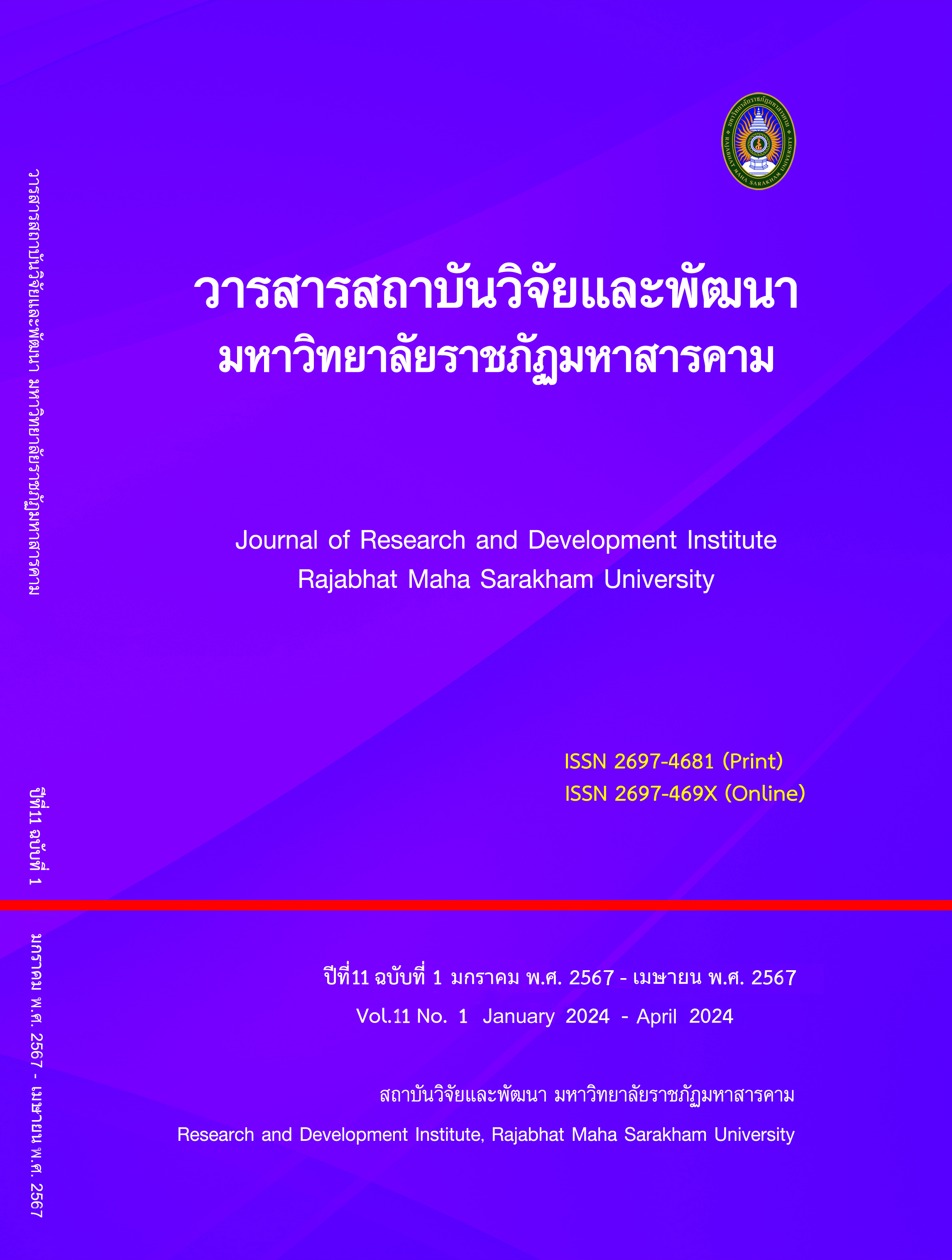THE STUDY OF LOGICAL THINKING ABILITY USING ARIYASACCA BASED LEARNING WITH CARD GAMES IN THE SUBJECT S16101 SOCIAL STUDIES OF GRADE 6 STUDENTS AT CHUMCHONYODKAENGSONGKRO SCHOOL, KALASIN PROVINCE
Keywords:
Organizing the learning of the Noble Truths as a basis, card game, logical thinking abilityAbstract
The objectives of this research were to study the logical thinking ability and investigate the academic achievement in the subject S16101 Social Studies of Grade 6 students in the subject S16101 Social Studies at Chumchonyodkaengsongkro School using Ariyasacca Based Learning with Card Games. The students were expected to achieve an average logical thinking ability and academic achievement of not less than 70 percent of the full score, and the number of students who met the criteria should not be less than 70 percent of all students. In addition. The target group was 20 students in Grade 6/1 studying in the second semester of the academic year 2022 through purposive sampling. This research employed a Pre-Experimental Design, utilizing the One-Shot Case Study approach. The tools used in the study comprised two types: 1) Experimental tools, which included 7 lesson plans of Ariyasacca-Based Learning along with card games, focusing on Learning Unit 2: Dhamma Principles. The total teaching time was set at 12 hours. 2) Data collection tools included assessments for logical thinking ability and academic achievement. The statistical methods employed for data analysis consisted of mean (), standard deviation (S.D.), and percentage (%).
The results of the research indicate that: The grade 6 students who underwent Ariyasacca Based Learning along with the card games demonstrated higher scores in logical thinking ability. The average score was 34.25, equivalent to 76.11 percent. Fifteen students met the criteria, constituting 75.00 percent of the total number of students, exceeding the specified threshold. And they exhibited academic achievement scores. The average was 22.39, equivalent to 73.67 percent. Fifteen students met the criteria, making up 75.00 percent of the total number of students, exceeding the specified threshold.
References
Chaisiri, K. (2013). Developing Manual of learning activities by using SSCS method and Ariyasaj 4 to promote responsibility problem solving and academic outcome in Mathematics of Matthayomsuksa 1 students. (Graduated Thesis). Sakonnakorn: Rajabhatsakonnakorn University.
Eduzones. (2022). Eduzones the education community. Retrieved May 23, 2022, from https://www.eduzones.com
Intasara, W. (2019). Change the classroom into a play room. Bangkok: Suandusit University.
Khammanee, T. et al. (2000). Guidelines for reforming the learning process Findings from a multi-case study in English. Bangkok: Chulalongkorn University.
Khammanee, T. (2021). Teaching Methods: the knowledge for effective learning management. Printed NO.23. Bangkok: Chulalongkorn University.
Office of the National Education Commission. (1997). Learning theories to develop the thinking process of learning models in terms of theory and practice. (Teaching Quality Development Project, Teaching Quality Development Center). Bangkok: Office of the National Education Commission.
Office of the Secretariat of the Education Council Ministry of Education. (2017). National Education Plan B.E. 2560-2579. Bangkok: Phrikwan Graphic Company Limited.
Phalopakorn, D. (2022). The outcome of developing motivation in history class using Card game of Matthayomsuksa 3 students case study of professional learning community in Mahasarakham University demonstration school (secondary). Academic Journal of Mahamakut Buddhist University Roi Et Campus. (11)1,1.
Ratchawong, A. (2013). The Effects of Learning Provision for Religion, Morality and Ethics Subjects Taught by the Four Noble Truth Method for Mattayom Suksa III Students. Thesis of Master of Education (Social Studies). Chiang Rai: Chiang Rai Rajabhat University.
Sattaboot, J. (1983). Research Methods. Khonkaen: Faculty of education Khonkean University.
Wangsoongmern, P. (2020). The Development of Learning Achievement and Problem-Solving Skills on the Buddhist Principles of Mathayomsuksa Four Students at Wapi Pathum School by Using the Four Noble Truths Learning Management. Thesis of Master of Education (Social Studies) Rajabhat Maha Sarakham University.
Downloads
Published
How to Cite
Issue
Section
License
Copyright (c) 2024 สุนทร สุดชา, อังคณา ตุงคะสมิต

This work is licensed under a Creative Commons Attribution-NonCommercial-NoDerivatives 4.0 International License.
Articles that are published are copyrighted by the authors of the articles







